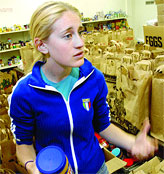 |
 |
|||||
 |
 |
 |
 |
 |
|||
 Laura Metzger works at the food pantry at St. James Parish on Wabash. Catholic New World/ David V. Kamba |
Poverty, Peanut Butter, and the Power of Service
Amate House’s young adults make a difference by Michelle Martin Staff Writer Laura Metzger, a fresh-faced 23-year-old from a town smaller than Mayberry, doesn’t seem like the best fit for the St. James Community Service Center. And with a degree in math and business from the University of Notre Dame, she doesn’t seem to have the background for working at a food pantry. But Metzger found that her skills have helped in unexpected ways. Take, for example, peanut butter. St. James Food Pantry served an average of 547 households a month in 2004. Each of those households received bags of food containing, among other things, breakfast cereal, rice, beans, canned vegetables and soup, and, yes, peanut butter. “Every single person that we give food to gets a jar of peanut butter,” said Metzger. “It’s a really good source of protein.” It also requires no cooking and no refrigeration, and most people—even kids—like it. The problem was, more than 40 percent of the pantry’s food budget went to buy it. Metzger realized the issue after spending about a month working at St. James, and decided to ask St. James’ three sharing parishes—Our Lady of Perpetual Help in Glenview, St. Edna in Arlington Heights and Ss. Faith, Hope and Charity in Winnetka—to do “peanut butter drives” instead of unspecified “canned good drives.” The parishes responded. “You can tell by our invoices,” said Metzger. “We spent over $2,000 for food in September. We were down to $1,000 in October, and by January, we were at $400.” Metzger is one of more than two dozen young adults spending this year as full-time volunteers with Amate House, the Archdiocese of Chicago’s young adult service programs. This year, the program has 26 full-time volunteers and eight DePaul University student volunteers, who contribute six to 10 hours a week. Overall, they were expected to contribute more than 50,800 hours in fields such as teaching, counseling and advocacy. The volunteers live in community and work in a variety of service positions. Each receives a stipend of $100 a month and $500 at the end of the 10-month commitment, along with housing, food, transportation to and from work and health insurance. At the end of the year, volunteers generally qualify for a federal education credit, which can be applied to student loans or future tuition. Amate House volunteers have served more than 136 organizations in 10 Chicago neighborhoods since 1984. This year, their hours were expected to generate more than $877,500 in “public value,” said executive director Mark Laboe. Agencies that host volunteers generally donate at least $10,000 a year, Laboe said. The rest of the $640,000 budget comes from other fundraising. At St. James, Metzger has been able to gather data and generate statistics on how many people the food pantry serves, where the money comes from and where it goes. “I learned that you need people with business degrees in food pantries and in the non-profit sector,” she said. That doesn’t mean Metzger is fulfilling her service commitment in her cubicle. The food pantry is open three mornings a week, and she spends most of that time serving clients and packing bags. The other two days she and her supervisor, Presentation Sister Barbara Rastatter, visit elderly and homebound parishioners. The visits to private residences, nursing homes and senior buildings have led to a greater appreciation for faith, Metzger said. “I was never a Eucharistic minister before,” she said. “Now when I can bring Communion to someone, it means so much to them. And they tell me how it would mean the world to them to be able to go to Mass. You think about all those Sunday mornings you got up and were tired and wanted to go back to bed.” While the neighborhood is home to two of the last remaining public housing projects—the Dearborn and Ickes Homes—and has more people, more poverty, more crime and more social problems than she was exposed to in her hometown of Bemis Point, N.Y. (pop. 381), she has never felt threatened. “The people here are so welcoming,” she said, gesturing around the social care center. “It felt like home.” Her other home is the Amate South residence, 3600 S. Seeley. She lives in community with 10 other volunteers, who do everything from teach and run after-school programs to providing health care and advocacy efforts. A similar group lives at Amate North, at St. Mary of the Lake Parish in Uptown, and a smaller group lives at Amate Little Village, serving primarily Spanish-speaking clientele in a variety of programs. The group members live together, pray together and learn from one another, Metzger said. “I’m working here, but I’ve learned so much about so many social justice issues,” said Metzger, adding that members of her community have extended their concern around the world, writing letters to President Bush urging U.S. action in the Darfur region of Sudan. When her Amate year ends in June, Metzger plans to head home to Bemis Point for a brief vacation, and then back to South Bend to look for a job and pursue a master’s degree in business. But she also plans to find a way to volunteer. “Amate House is a one-year commitment,” she said. “But it changes your whole life.” |
||
|
|
|||